For close to nine months, higher institutions across the country were closed as a result of the COVID-19 pandemic. With the relaxation of restrictions, most tertiary institutions resumed classes in January — some virtual and others physical. In a memo dated September 18, 2020, the National Universities Commission (NUC) wrote to vice-chancellors on the guidelines for the resumption of academic activities.
“Universities must continue to adhere to the safety protocols and the Nigeria Centre for Disease Control (NCDC) guidelines which are very much in force. The decision to re-open institutions should not, in any way, diminish the importance attached to full compliance. The virus is still potent and there is no cure as at yet,” the NUC had said.
But the Academic Staff Union of Universities (ASUU) took a different position on the reopening of schools, saying there are inadequate measures in place to ensure the safety of students and staff.
“The response of the public universities to the call by the National University Commission for their readiness to reopen indicates that public universities are not ready,” Olusiji Sowande, coordinator of the Lagos zone of ASUU, said.
Advertisement
“Hostel accommodation is inadequate; there are no facilities on the ground to carry out physical distancing in large and crowded classes; water and electricity supplies are not reliable. Reopening tertiary institutions without taking concrete steps to address these issues will be suicidal. Therefore, the government should be ready to take responsibility for any possible negative consequences after the reopening of universities.”
In the past month, TheCable reporters visited some institutions to observe the level of compliance with COVID-19 safety measures, state of health facilities on campus, and the institutions’ readiness to address the medical needs of students.
OVERCROWDING, STAMPEDE, PROTEST AS STUDENTS BEGIN EXAMS
Advertisement
On February 10, thousands of students of Ebonyi State University (EBSU) converged for a computer-based test (CBT) on campus. There was no social distancing; many students were without face masks, just as there was no handwashing equipment in sight. The crowd was massive. What started as a peaceful gathering later snowballed into a stampede. Five students were reported to have fainted and they were immediately rushed to the nearby clinic.
The next day, there was a protest. Students trooped out carrying placards, chanting songs, lamenting about the poor state of infrastructure on campus and the lack of coordination for students expected to write examinations during a pandemic. The students blocked the Abakaliki-Enugu expressway, as they demanded an end to the computer-based exams.
But the situation is not peculiar to EBSU.
At the Ambrose Alli University (AAU), Ekpoma, Edo state, hundreds of students marched towards the information and communications technology (ICT) centre on campus to write a CBT exam when TheCable visited the school.
Advertisement
Students wearing different types of face masks were seen sauntering in and out of the school as the first semester examinations, which should have been written last year, were ongoing.
At the university’s main gate, you will be turned back by the security if you have no face mask on. There were about ten bucket taps stationed at the entrance where incoming students and visitors are supposed to wash their hands, but the reporter noticed that most of the students did not comply.
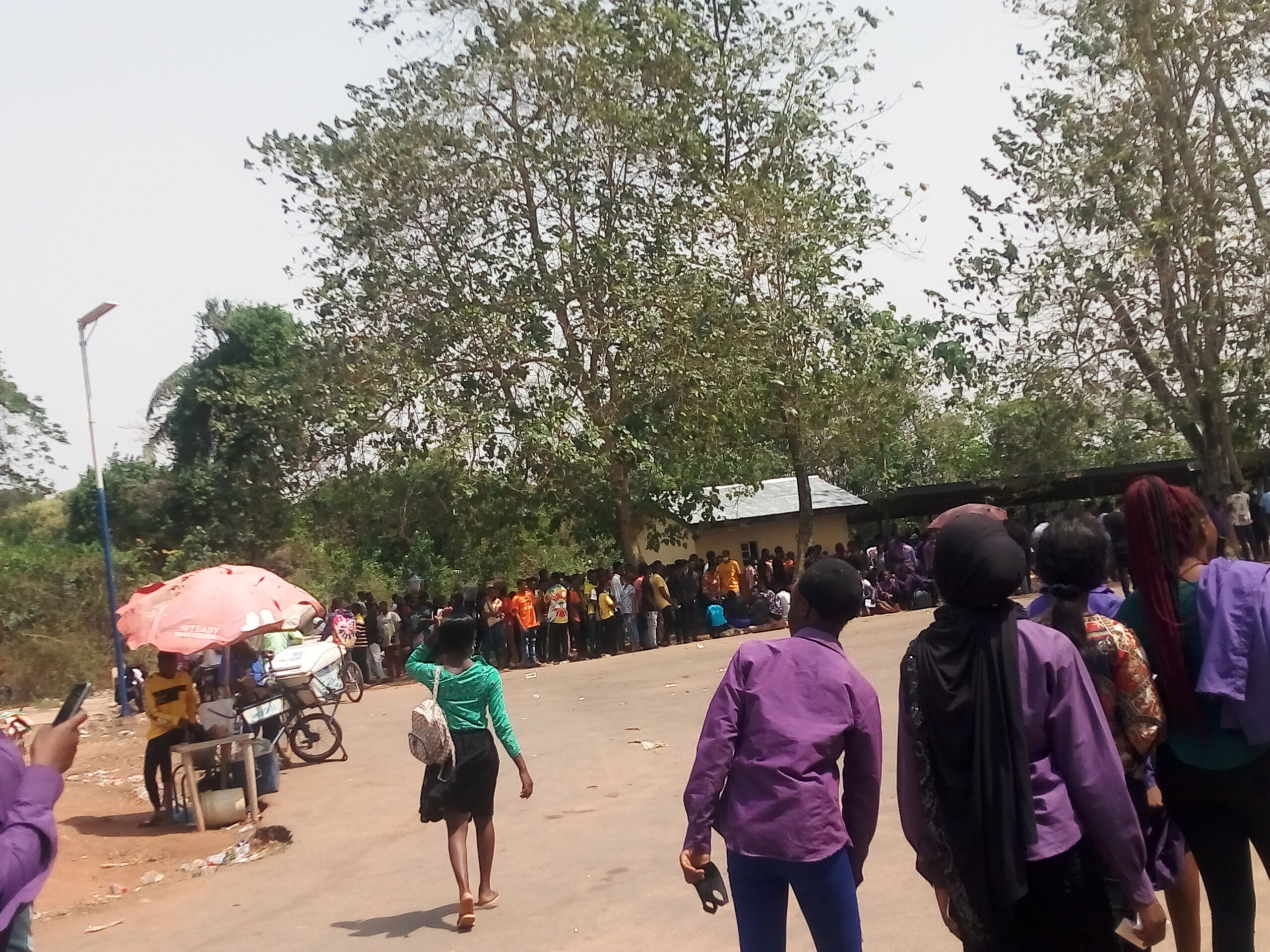
Within the school premises, some of the students had no face mask on. When interrogated, some said they do not believe there is anything called coronavirus.
“No one holds you for not putting on a face mask unless you’re going for an exam. That’s the only time I know they are serious with the guideline. A lot of us don’t even believe there is really COVID-19 because we won’t be writing exams in this situation. If there was, a lot of us would have contracted it. I haven’t heard that any student has fallen sick due to COVID-19 since we resumed,” Judy Anyanwu, a 200-level student of education, said.
Advertisement
“Look around. See the way everybody is clustering together without protection with no care in the world. Nobody is even scared. Even in the hostel, nobody monitors you.”
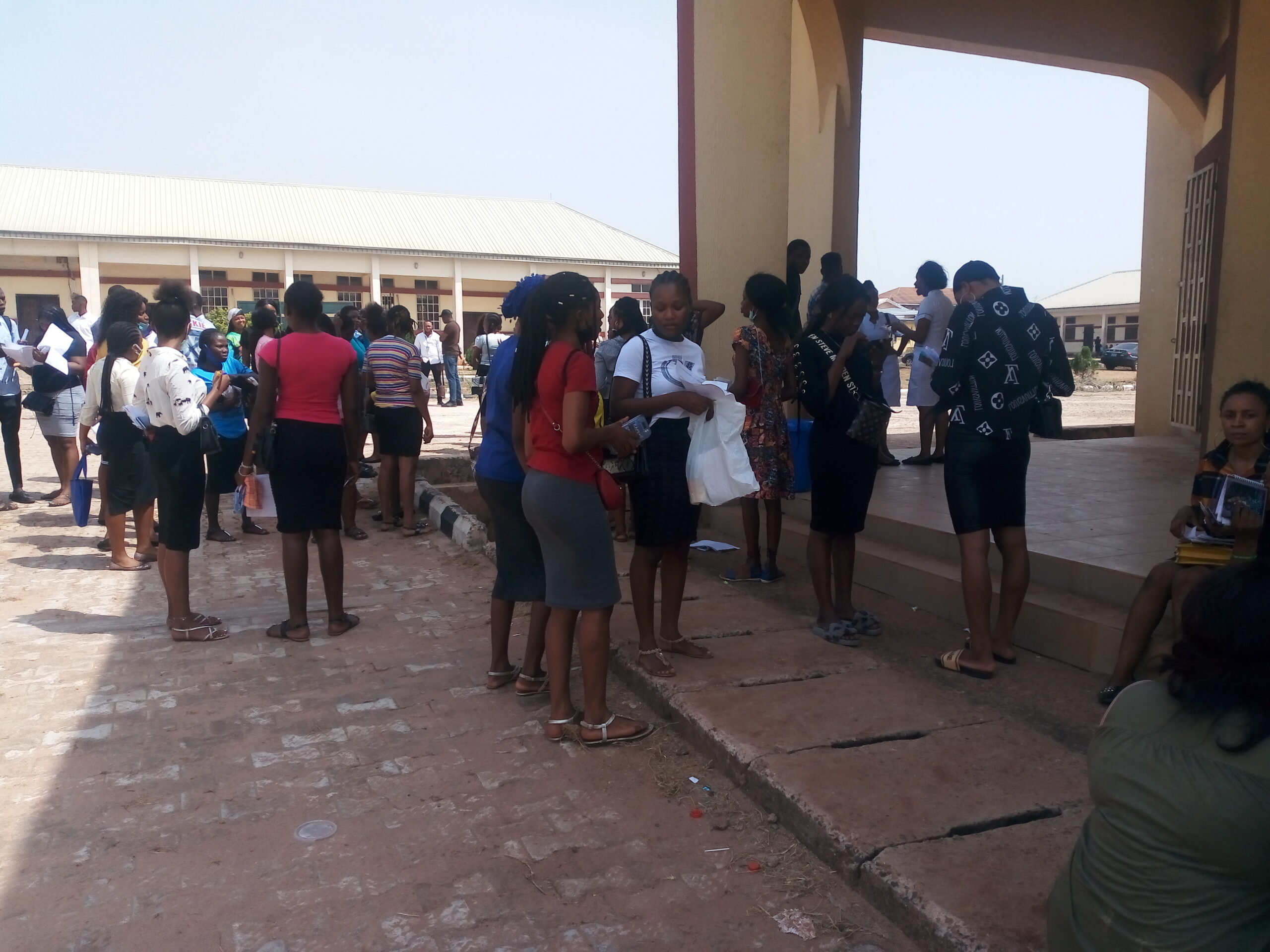
At the school’s college of medicine, students trooped out of the lecture theatres, having just finished writing a paper.
Advertisement
Favour Aribisale, a 300-level student of the department of nursing, told TheCable that although there were bucket taps placed at strategic points, students hardly make use of them. She, however, said social distancing was observed in the examination halls.
“I’m an example; I’ve never washed my hands, despite having these buckets of water around,” Aribisale said while laughing.
Advertisement
“There was spacing during our exams — one seat empty in-between. We used two big halls for more than 300 students. There are washing basins at the entrance but students don’t really wash their hands. The major thing is for you to use your face mask before entering the hall.”
Advertisement
SKELETAL SERVICES AT THE HEALTH CENTRE
When asked if there had been suspected cases of COVID-19 in the school, a student answered in the negative. “If a student tests positive for the disease, how would we know? The health centre is locked because of NASU strike,” the student said.
But when TheCable visited the health centre, despite the strike by the Non-Academic Staff Union (NASU), six officials were found seated outside. Taking the reporter around, a top official at the centre, who insisted on anonymity as he was not authorised to speak to the press, said the staff members have not really been working and most of the students are not aware that the clinic is open.
He noted that the work schedule is skeletal as a result of the strike, but that the school is prepared for emergencies and adequately equipped with protective kits.
“I can say the COVID-19 observance is 100 percent ideal. You can see all these signs — ‘no face mask, no entry’ — everywhere. Even when they come, they wear their masks but once they leave, it is removed,” the official said.
“For now, any student coming in must wear a face mask and in case of emergency, we have to protect ourselves. Like a student that was brought four days ago, she was unconscious. Do you tell an unconscious patient to wear a mask? All those things, when you make rules, there are exemptions. In case of emergencies or COVID-19 scare, the patient is referred to Irrua Specialist Teaching Hospital.”
He added that the NCDC had provided the school with protective gears but they are not needed at the health centre because it is not designated for the treatment of patients. When the reporter pointed out that none of the preventive measures stated was carried out while entering the school premises, he replied: “It is difficult to enforce all these rules in a large population. There is a limit to how far you can enforce the rules. We are doing our best and we pray we don’t have an outbreak.”
The situation was not really different at the University of Benin (UNIBEN), Edo state, when TheCable visited. From the entrance to the heart of the campus, it was a free world. No one compelled students or visitors about compliance.
“We were told to resume with our face masks, hand sanitisers. Before you go into any class, you wear a face mask. Lectures for some courses are online but the use of face masks is not really working; it’s only at the gate. Even when students come into the school, they remove it. It is not being taken seriously,” a student who identified herself as Destiny said.
At the faculty of education, while students stood chatting in the corridors, the classes were jampacked with students waiting for their lecturers.
UNIBEN: IT’S DIFFICULT TO ENFORCE COMPLIANCE
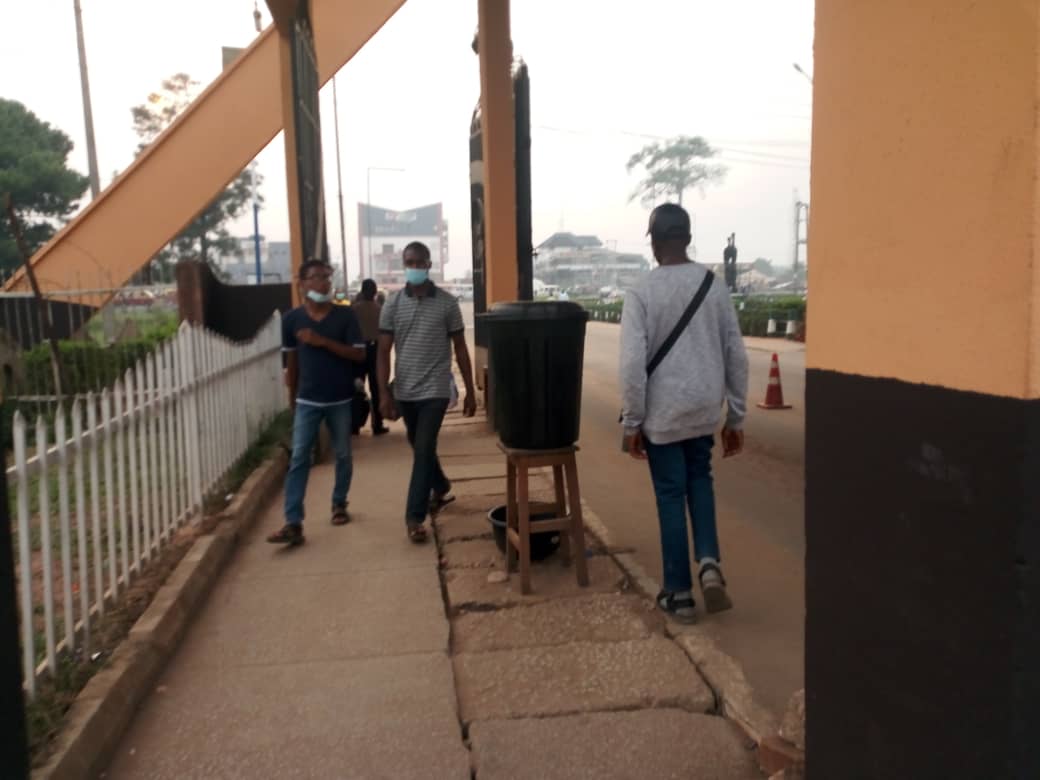
Wilson Sadoh, dean of the college of medicine, said the university set up a COVID-19 monitoring team to enforce compliance. Sadoh, who is also the chairman of the COVID-19 monitoring team at the institution, noted that it’s been difficult ensuring that the students comply with the guidelines. The professor said despite the signs and measures put in place to prevent infections, the students hardly adhere.
“We plan and meet and put some things in place. We looked at the classrooms, methods of teaching, provide hand washing basins, big drums with taps, liquid soaps, and sanitisers for the hostels and faculties. We gave face masks to strategic areas like the health centre. We have a club that monitors on a daily basis; we call them the surveillance team,” Sadoh said.
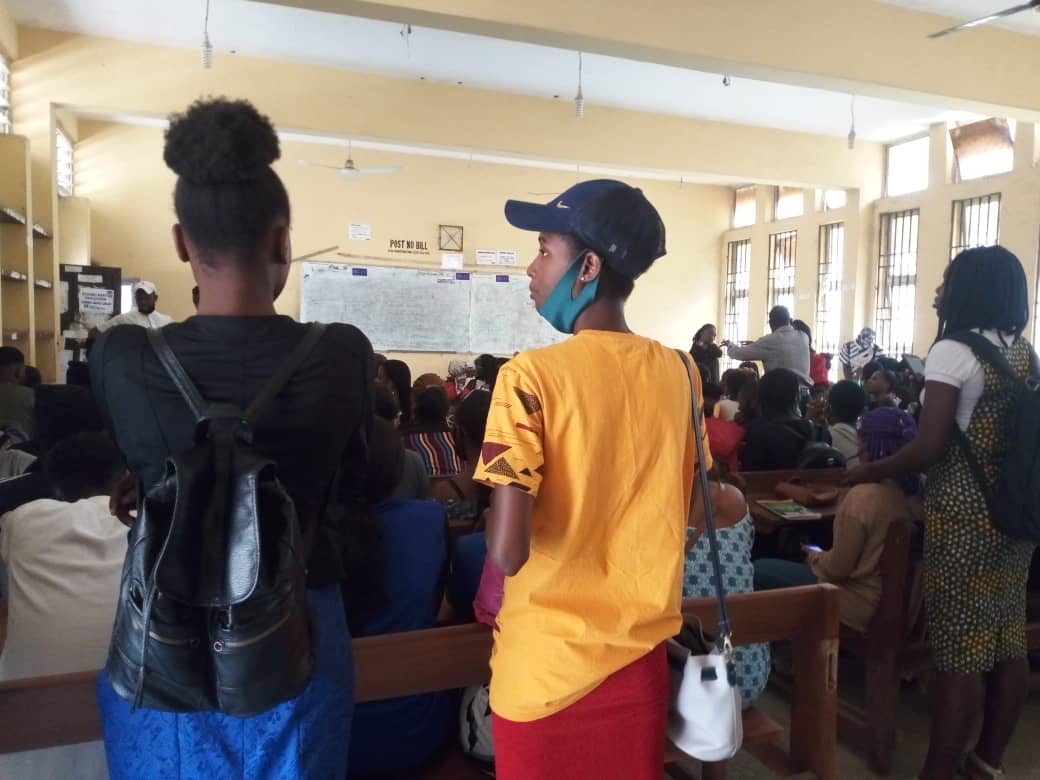
“We realised that it is difficult to get students to comply, so we have been reinforcing. When you get there, they do the proper thing but once you leave, that’s the end. So, we realised that we should just keep doing what we are doing; they are not children and should know better. I keep telling them, if there’s an outbreak, the school will shut down. So, the level of compliance, right now, is very poor but we are hopeful that with the surveillance, things will pick up.”
At the Tai Solarin University of Education (TASUED), Ijebu-Ode, Ogun state, compliance begins and ends at the gates. The security officers at the entrance of the institution ensured that anyone entering the campus made use of the hand-washing equipment. Any visitor without a face mask is turned back. The students and staff often complied — but as soon as they made their way in, the face masks were removed.
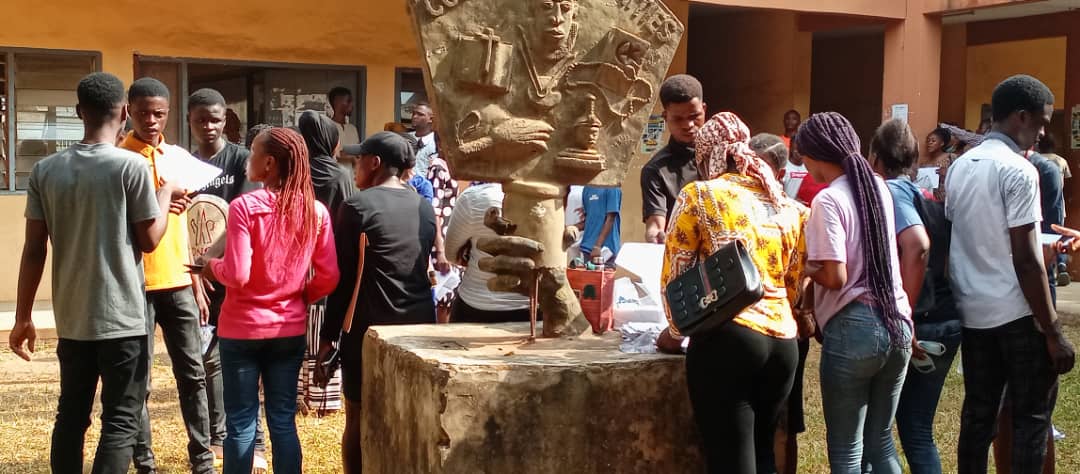
At the college of vocational and technology education, 100-level students converged to submit their course forms, without wearing face masks or observing social distancing. When this reporter asked one of the students, who identified herself as Omolola, if there is no enforcement, she smiled and responded: “How can there be any social distancing? Have you seen our crowded classes? Even the final year students writing exams are stuffed in classes without face masks. If you quickly go to where they are writing computer-based test (CBT), you’ll still see hundreds of students on a queue.”
At the CBT area, students queued up under the sun, waiting to enter the hall to write the test. For more than three hours, the queue did not significantly decrease as more students joined in. The school guards found it challenging to control the crowd as the students struggled to make their way into the hall. In the classrooms where final year students were writing examinations, the majority of the students had no mask — even the lecturers.
Bakenne Nuraen, TASUED’s public relations officer, blamed the lack of compliance on the strike embarked upon by the non-teaching staff of universities across the country, adding that they were expected to enforce the protocol.
“On the issue of the long queue of students wanting to write CBT, the university noticed this challenge a long time ago and that’s why the university is embarking on a new building project, just directly opposite the old e-learning block. But due to the pandemic and the lockdown, the project was slowed down, but now it’s almost at the point of completion,” he said.
‘NO COVID-19 IN SOKOTO’
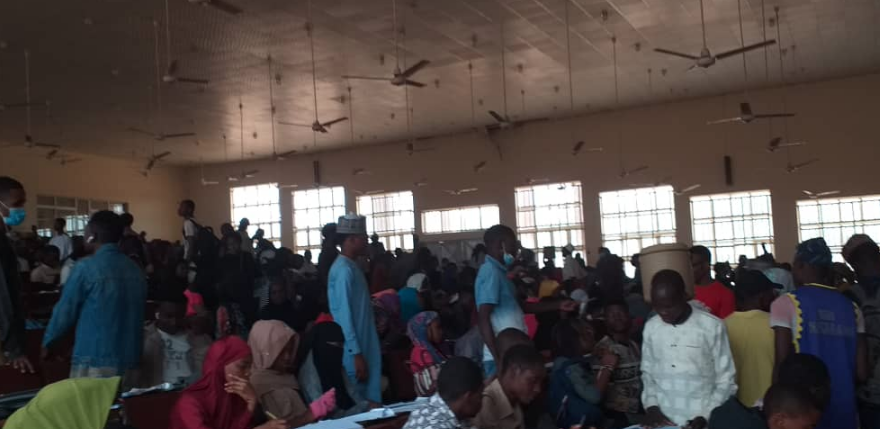
At Usmanu Danfodiyo University, Sokoto (UDUS), all entrances to lecture halls had no handwashing spot or sanitiser. One of the halls in the university, where 100-level students were taking math 101 lectures, was fully packed.
Clad in a red hijab and standing in front of the hall where she had just finished a lecture, Sadiyya Bello, a 100-level student of Social Science, insisted that there’s no COVID-19 in Sokoto.
“No COVID-19 in Sokoto. The weather isn’t friendly to it. We wear face masks, but there’s nothing like social distancing and not all of us wear face masks. Some of our lecturers do not put it on; only a few of them do and when they even wear it, they take it off when the lecture commences. For me, I don’t believe in the pandemic,” she said.
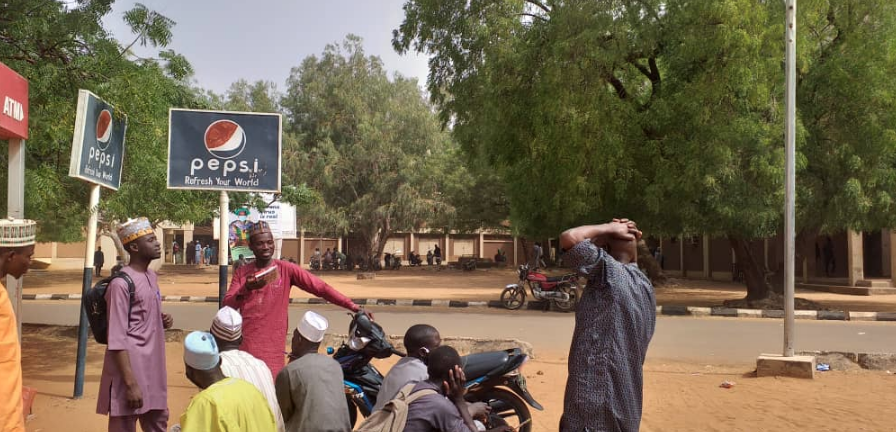
When asked about COVID-19 protocol in his department, Sidi Ahmad, a 400-level student of adult education, said compliance is not “seriously applied”.
He said: “Let’s talk about the use of face masks. Most times, you won’t see students using them or using hand sanitisers. It is only applied when you go to the library. That is where you must wear your face mask even though there is no hand sanitiser there too. But putting on your face mask is always needed before you can be allowed to enter.”
Just like what was obtainable in TASUED, Ibrahim Umar, the director-general of health at UDUS, blamed the non-compliance on the non-academic staff that were on strike.
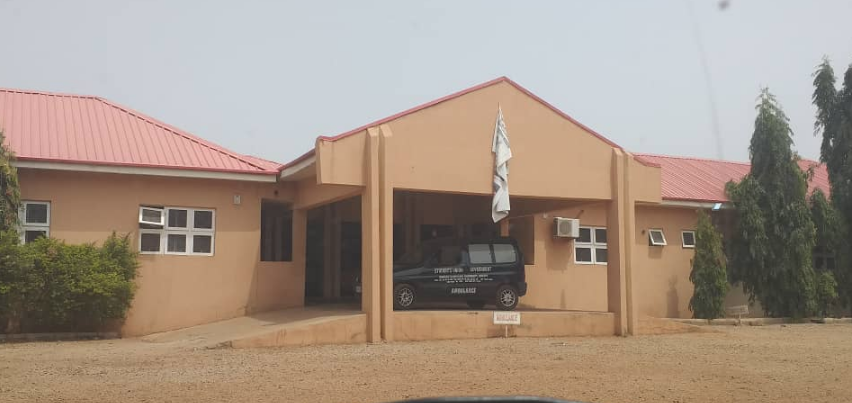
“We provided handwashing points at the entry of every facility in the university. The people that are supposed to impose those things are on strike, but we still do as much as we can with the little available resources we have,” he said.
The non-academic staff suspended their industrial action a few days after TheCable visited the institutions.
NUC: WE WILL INVESTIGATE
Although there are no cases of mass infections recorded yet at higher institutions across the country, there has been poor compliance with health measures. There is also a lack of necessary infrastructure that can keep visitors, staff and students safe while learning.
Despite approving the physical reopening of the universities, the situation on the ground shows that the directive of NUC regarding COVID-19 protocol compliance is not being adhered to.
Speaking on the development, Ibrahim Yakasai, director of corporate communications at the NUC, said the universities complied with the stipulated guidelines at the point of reopening. He said the commission will carry out an investigation to identify the institutions flouting the protocol.
“We went around to monitor their compliance in putting in place such guidelines. As far as I am concerned, all of them complied at the point of opening up. What you are telling me now is news to me. I will challenge you to go to those universities on why they are flouting the rules and guidelines,” Yakasai said.
“We asked them to obey the rules; gave them guidelines; went and checked if those guidelines were put in place but you can’t be with them 24/7. Any university flouting the rules, please we would first accost the leadership of the university and we will also do our own investigation.”
Reporters: Taiwo Adebulu, Ebunoluwa Olafusi, and Mansur Ibrahim.
This is a special investigative project by Cable Newspaper Journalism Foundation (CNJF) in partnership with TheCable, supported by the OSIWA. Published materials are not views of the OSIWA.
1 comments
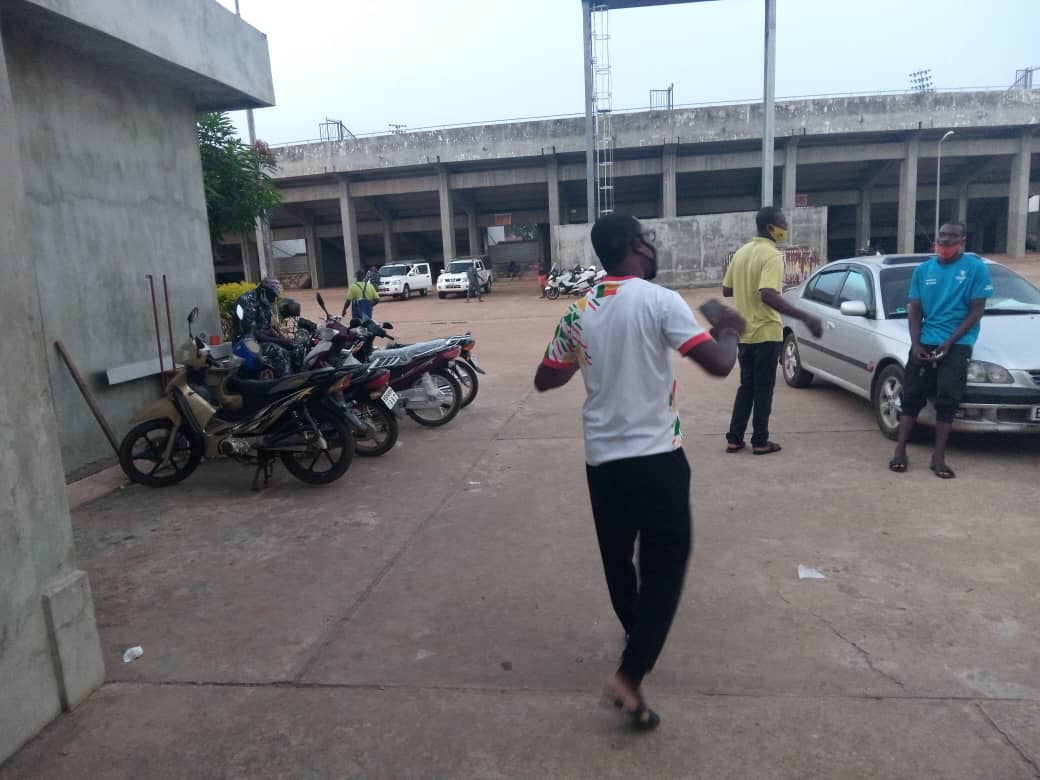
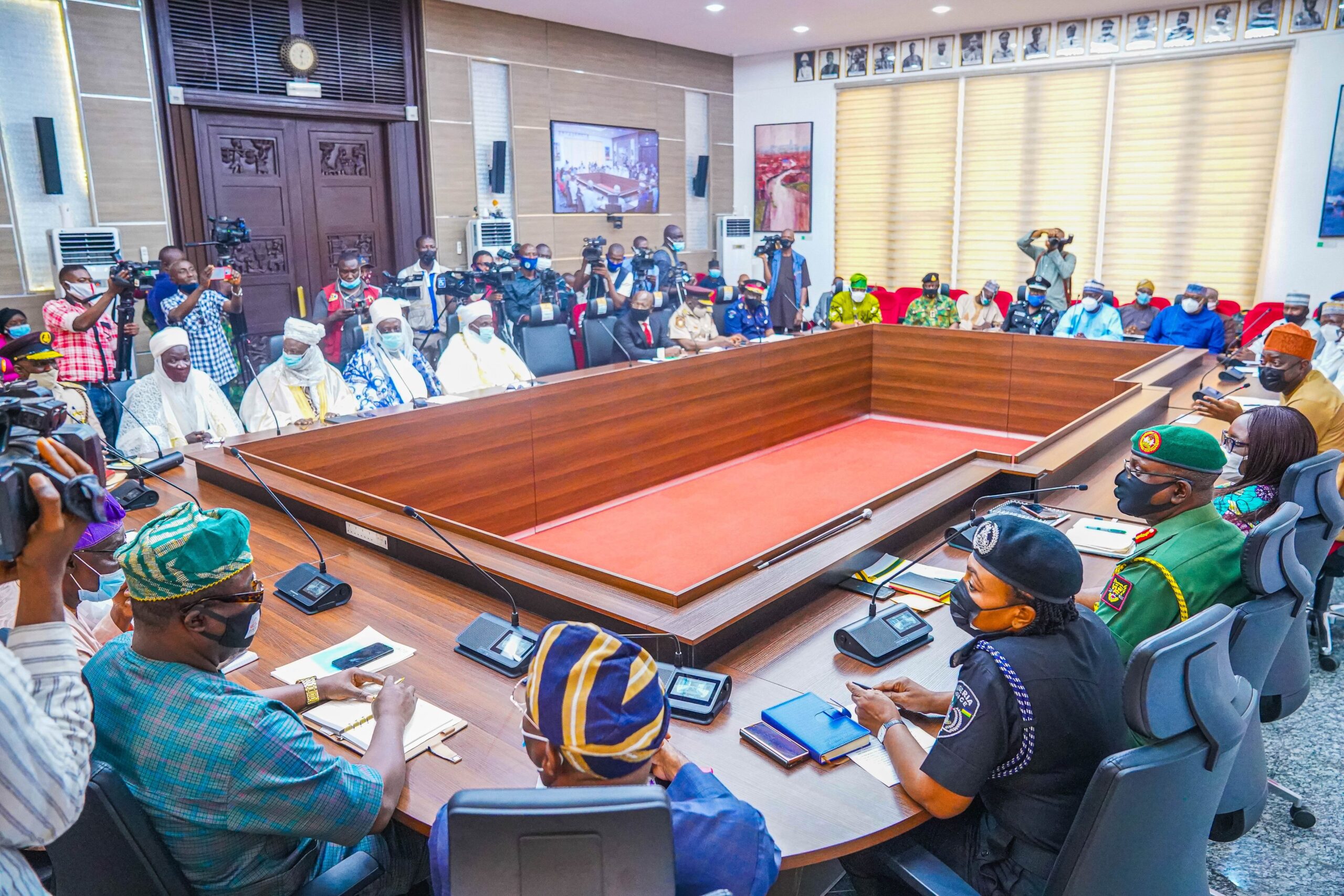
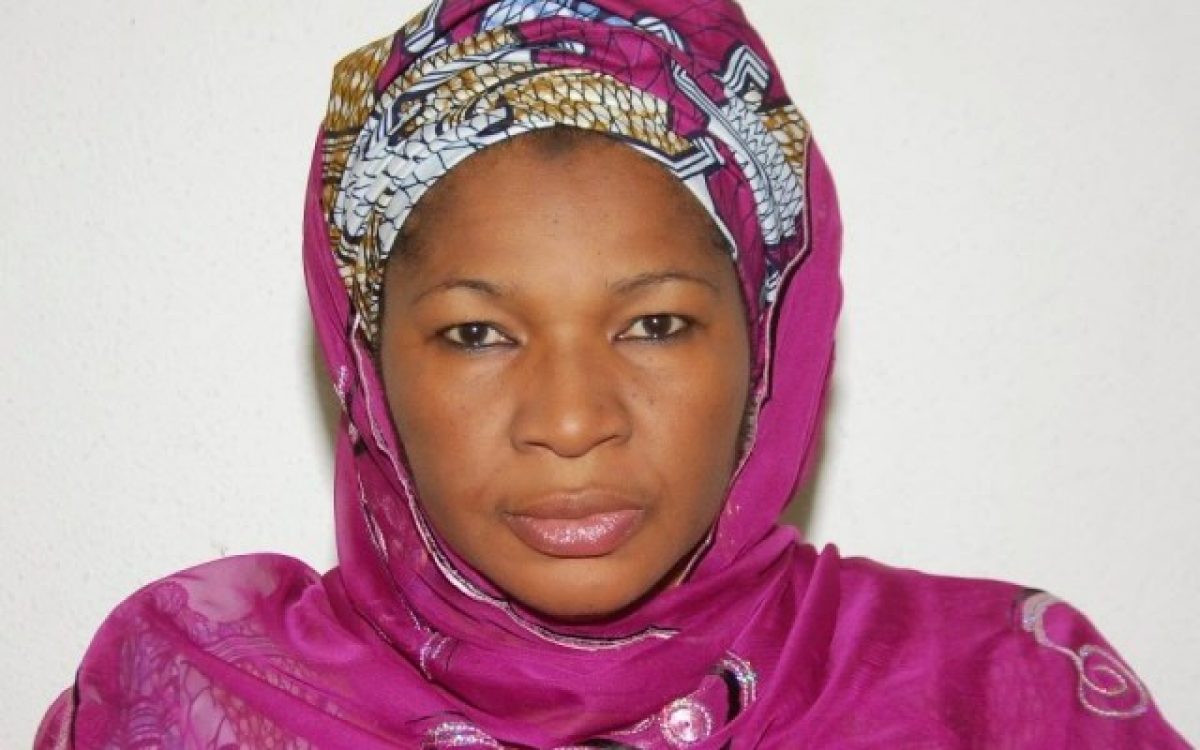


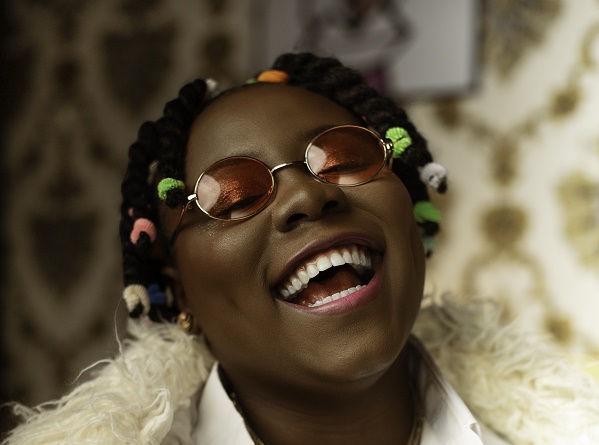
I think the covid-19 protocol shouldn’t be neglected. However, it is important to note that many schools do not provide any of the necessary facilities to ensure appropriate compliance with the covid rules. Sometimes, the school authorities should be blamed.